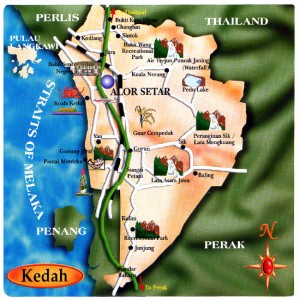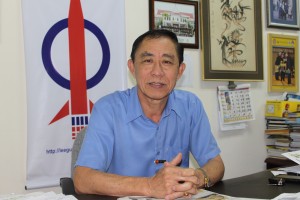In the September edition the Rocket covers one of the nation’s crucial battleground states, Kedah. DAP’s sole elected representative in the state, Kedah DAP state chairman and Kota Darul Aman state assemblyman Lee Guan Aik, speaks about some of the changes that the Kedah PR state government has brought about, what PR needs to do to retain the state and DAP’s appeal amongst the Malays here.
State DAP Post: State Chairman
State Assembly Representative for: Kota Darul Aman (2008 to present)
Other interest: Businessman
Join DAP in: 2004
Age: 62
Tell us about yourself and any personal anecdotes about yourself.
I was an air force pilot for 21 years, retiring in 1992. However as I was a too young to go into full retirement, I decided to be involved in business. However, now as a result of me being elected, my son has now taken over the business.
I have a penchant for music, courtesy of my armed forced days. I managed to learn the organ. Another one of my interest is in computers. After my retirement from the armed forces, I began to spend a fair bit of time in acquiring new knowledge and on the internet. It’s a waste that many of my peers have lost out by not learning computer skills and the internet as they are missing out on a lot of knowledge-seeking. It is such a useful tool for knowledge.
Why did consider joining politics? Why did you choose DAP?
When I was in the armed forces I witnessed how concerted discrimination was being practised in the government, as the new army recruits were mostly for bumiputeras and even the promotional prospects favoured them as well. Later after I retired, I read about of how DAP Secretary General Lim Guan Eng was jailed unjustly for allegedly maligning the then Melaka Chief Minister. I felt a stirring in my conscience and my heart, wanting to see this country changed
When BN won overwhelmingly in the 2004 general elections (GE), I realised I needed to be involved actively in order to realise this change. I saw in DAP as a party that stood and fought unceasingly for the righteous principles in this country. That was when I decided to join Kedah DAP.
What were some of the challenges and issues that you faced during and after the GE?
Even before the GE started Kedah DAP faced many challenges as many of the national DAP leaders were unable to campaign for us in ceramahs. Additionally we were also restricted in our ceramah venues and permits, causing us to only be able to hold two ceramahs for the entire campaign. However despite our minimal campaigning, the people were clearly ready for change
Serving the constituents and by extension politics is a competitive business. We have to be constantly vigilant in addressing the people’s problems and the broader community issues. As BN and MCA through the mainstream media (MSM) often manipulates trivial issues to bad-mouth DAP especially on non-Malay issues, we have to be quick and yet careful in answering their attacks. This is to avoid hurting our Malay constituents unintentionally. It’s a fine balancing act.
Take for example, the usage of Jawi billboards in Kedah. BN and the MSM played the issue to the hilt while failing to mention that there were also many Chinese language billboards around Kedah. This move came about as the Kedah state government wants the local Malay and Chinese culture and heritage to be revived. However there are only a few number of Jawi billboards. Then there was also the pig abattoir demolition issue in Alor Setar.
What are the issues at stake in Kedah?
 One of the biggest problems is that of inaccurate perception by outsiders. Many of them have complained that the Kedah state government has not been implementing many changes in administrating the state and there is a lack of development.
One of the biggest problems is that of inaccurate perception by outsiders. Many of them have complained that the Kedah state government has not been implementing many changes in administrating the state and there is a lack of development.
One of the common gripes by outsiders is that of the higher bumiputera housing quota requirement. Generally it only affects Alor Setar as there is a shortage of freehold land where housing developers can build and sell their houses. Most of the land here is Malay reserve land which non-Malays are not allowed to own legally. Outside of Alor Setar, it’s not applicable.
However the state government has allowed land swapping to alleviate this land shortage issue with a requirement that the developers sell to the bumiputeras a fixed percentage of the houses built. The state government wants the poor, which mainly consist of the Malays, to have a fair chance of owning affordable houses. Most of the Kedah people accept this ruling as the majority of houses are sold out. Some of the developers are not happy and have complained rather vocally about it.
As for the poor state of the economy, most of the local residents are aware that it is a global phenomenon and that the federal government’s policies affect it the most.
How are people the assessing Pakatan in Kedah? Will PR retain Kedah?
Overall, the local populace have complimented the PR state government as sincere in wanting to help the various races. They know that despite the state government being poor revenue-wise, it has consistently given generously to non-Malay cultural activities and Chinese and Tamil vernacular schools.
One particular example was the state government paying electricity and water bills for 96 Chinese primary schools last year. The state government also has established a Race Integration Fund to promote inter-ethnic relationship. This is unprecedented in Kedah.
Perhaps it is because PR has consistently supported the vernacular schools and non-Malay concerns here that even the Prime Minister Dato Seri Najib Razak felt it necessary to begin his non-Malay voters’ bribing campaign in Alor Setar. He was in to town recently to provide RM 1.1 million for the Chinese primary schools, hoping to limit possible electoral damage for BN as a result of its declining popularity.
In the current political scenario, PKR holds the key to PR’s survival in Kedah. As the Kedah Malay electorate’s sentiment is split, PAS will be able to retain its Malay support base; however, PKR which is contesting in most of the non-Malay majority DUNs, will determine if PR will still retain the state in the next GE.
How is the cooperation amongst PR parties? Are there communication glitches amongst the parties?
We need to consult each other more often in order to limit adverse publicity for well-meaning policies. The top state leadership needs to be seen as more united and wiser in our choice of statements. Many have queried us on the entertainment centres ban issue. I believe that the Menteri Besar is doing the right thing, just not in the right manner.
The MB and PAS as the dominant party here needs to lead in promoting the cooperation level amongst the PR parties. Our appeal is limited amongst the rural and Malay populace as DAP is generally concentrated in northern Kedah and the Chinese-majority areas.
Since 2008, has the electoral support for DAP increase? Are the Malays responding well?
We have challenges especially in attracting the Malays to join DAP. DAP’s past association with PAP and the presence of many Chinese leaders and members in the party have given them the apprehension of joining DAP outright as they fear being labelled as Singapore lackeys and Chinese stooges by the Malay community. Only a handful of Malays are present in Kedah DAP.
The resistant mindset of Malays is hampering them from supporting us. It doesn’t help that many Malays, especially the rural ones, are still dependent on the mainstream media for information. Whatever good the DAP-led PR Penang state government has done, generally the news hasn’t reached them yet. We need to improve on the information dissemination process.
It helps that we are in association with PAS in lessening the Malay’s aversion toward us. Likewise, DAP plays an important role for PAS to attract the non-Malay support. Though we may not have as many party members as other PR parties, DAP has consistently garnered the most number of non-Malay votes wherever it contested. We have to work on our cross-party and cross-communal appeal. -The Rocket




